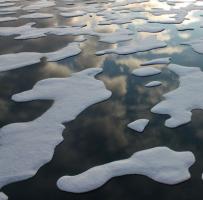
Photo: NASA/Kathryn Hansen
Nine nations; the United States, Canada, Norway, Russia, Denmark, Iceland, Japan, South Korea, China; and the European Union have agreed to ban commercial fishing in the Central Arctic Ocean for at least the next 16 years. The goal of the pact is to allow scientists enough time to better understand the region’s ecology and the potential effects of climate change before allowing widespread fishing.
“There is no other high seas area where we’ve decided to do the science first,” says Scott Highleyman, vice president of conservation policy and programs at the Ocean Conservancy in Washington, D.C., who also served on the U.S. delegation to the negotiations. “It’s a great example of putting the precautionary principle into action.”
The magazine Science reports: Thus far, thick ice and uncertain fish stocks have kept commercial fishing vessels out of the CAO, but the region is becoming increasingly accessible because of rapid loss of summer sea ice. In recent summers, as much as 40% of the CAO has been open water, mostly north of Alaska and Russia, over the Chukchi Plateau.
As the summer sea ice becomes thinner and its edge retreats northward, more sunlight is penetrating the water, increasing production of plankton, the base of the Arctic food web. These sun-fed plankton are gobbled up by Arctic cod, which in turn are hunted by animals higher up the food chain, including seals, polar bears, and humans. Some parts of the Arctic Ocean’s adjacent seas, such as the Barents Sea (off the northern coasts of Russia and Norway), saw steep increases in primary production in 2016, approaching 35% above the 2003–15 average.
Under international law, these high seas are open to anyone. In the absence of an agreement, fishing there would not be illegal, but it would be unregulated—and some researchers, environmental groups, and policymakers fear it could harm the fragile and rapidly changing marine ecosystem. In the late 1980s, fishing trawlers from Japan, China, and elsewhere crowded the international waters in the Bering Strait between Russia and the United States and removed millions of tons of pollock. By the early 1990s, the pollock population had crashed. It has still not recovered.

But pumping oil and gas there is OK.
Stupid!